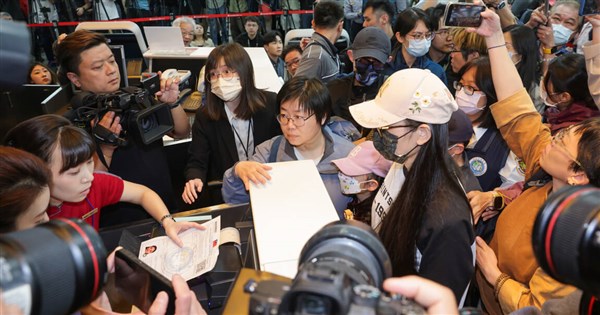Taipei, March 28 (CNA) The Supreme Administrative Court on Thursday rejected a second appeal by the Chinese wife of a Taiwanese man against a deportation order given to her for advocating “military unification” with China.
Liu Zhenya (劉振亞), a Chinese national with marriage-based legal residency, had her residence permit revoked by the National Immigration Agency (NIA) and was ordered to leave Taiwan by March 25 for advocating China’s “military unification” of Taiwan in videos posted on her Douyin account, “Yaya in Taiwan” (亞亞在台灣).
She is now barred from reapplying for a dependent-based residency permit for five years.
According to the Supreme Administrative Court, the Ministry of the Interior (MOI), which oversees the NIA, determined Liu had violated regulations governing Chinese nationals residing in Taiwan by posting content that threatened national security and social stability.
“From a procedural perspective, it is difficult to claim that the legality of the [MOI’s] order is manifestly in doubt,” the court said in a news release.
An earlier appeal by Liu, who voluntarily left Taiwan on Tuesday, was rejected by a lower court on March 21.
The Supreme Administrative Court’s ruling is final.
“It is difficult to conclude that allowing the [MOI’s] order to take effect would cause irreparable harm to the appellant’s [Liu] relationship with her spouse or prevent proper care and upbringing of their [three] children,” the court said, citing modern transportation and communication.
The court said that there was also “no indication, as claimed in the appeal, that the order forcibly required her to leave the country on March 25, 2025.”
According to the court, the order only required Liu to leave Taiwan within 10 days and did not “directly compel the appellant to depart, nor did it specify a date for forced deportation.”
Lo Shih-hung (羅世宏), a professor at National Chung Cheng University’s Department of Communication, questioned the deportation order and the decision to uphold it in a social media post on Monday.
According to Lo, the Taipei High Administrative Court’s March 21 ruling had misapplied a stipulation in the U.N. International Covenant on Civil and Political Rights (ICCPR) that “any propaganda for war shall be prohibited by law.”
Although Taiwan incorporated the ICCPR into its domestic legal system in 2009, Lo said that specific provisions related to the covenant have yet to be enacted.
